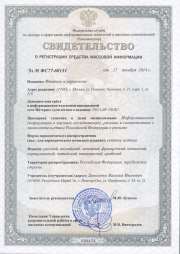MAIN PAGE
> Back to contents
Publications of Izvekov Stanislav Sergeevich
|
Taxes and Taxation, 2018-3
|
|
Izvekov S.S. - Subsidiary Responsibility for Non-Payment of Obligatory Payments in Cases of Private Bankruptcy
|
|
pp. 23-32
|
DOI: 10.7256/2454-065X.2018.3.25847
Abstract: The subject of the research is the correspondence of tax and levy legislation to competition laws and the influence of the latter on the principal of personal execution of tax responsibility. Izvekov views the issue in relation to regulation of legal relations arising in cases of bankruptcy. Noteworthy, that there are no in-depth researches that would be devoted to particularities of execution of tax responsibility in bankruptcy cases including that at the account of controlling persons. Being already a complex topic, obligatory payments become even a more serious issue when it comes to insolvency of citizens and individual entrepreneurs who are held liable both personally and to the full extent of its assets. The research is based on the methods of historical and comparative law as well as legal modelling. In his research Izvekov demonstrates new trends in the arbitration judicial practice that have been developing under new legislation and law interpretations. As a result of the research, the author of the article describes positive and negative factors caused by amendments to legal provisions that regulate subsidiary responsibility of taxpayer (citizen or individual entrepreneur) controlling persons. The author of the article also makes a number of practical recommendations to qualify relations between a bankrupt person and controlling person as the grounds for either recovery of damage or bringing to subsidiary responsibility.

|
Taxes and Taxation, 2017-8
|
|
Izvekov S.S. - On Recognizing Work Performance and Service Operations as VAT Tax Object in Taxpayer's Bankruptcy
|
|
pp. 15-26
|
DOI: 10.7256/2454-065X.2017.8.23863
Abstract: The subject of the present research is the problems arising at the point when tax and levy laws and bankruptcy laws cross. Even though researchers touch upon particular issues related to the topic when analyzing these or those problems associated with the legal regulation of bankruptcy relations, it must be admitted that there are no comprehensive efforts devoted to fulfilment of VAT obligations in bankruptcy. The object of the research is the social relations arising in the process of a bankrupt organisation performing their VAT obligations as a result of goods, works or services sale. The author of the article examines such aspects of the topic as the conceptualisation of the idea about recognising asset disposition and property right enforcement as VAT tax object. The author also makes an attempt to systematise various interpretations of legal standards and to fill in the gaps in legal regulation of recognizing insolvent taxpayer's property disposal operations performed in the process of regular economic activity of a debtor or bankrupt assets sale. The rationale of the research is caused by the need to improve applicable legal provisions on taxes and levies that do not fulfil the requirements of modern law-enforcement practice. The research is based on the methods of historical and comparative law studies. In the course of his research the author has defined contradictions in the legislation and judicial practice on the issues of fulfilment of VAT obligations by taxpayers in bankruptcy. The author of the article has also used the methods of legal modelling when analysing when analyzing VAT obligations in bankruptcy and distribution of monetary funds received from renting debtor's property as part of covering the debt of creditors whose rights are secured by the pledge of property. The researcher has made theoretical and practical recommendations regarding solution of problems in the sphere of the mutual interaction between tax legislation and bankruptcy laws. As a result of his detailed analysis of VAT obligations, the author has defined positive and negative factors of recognising debtor's property disposal, service and work performance operations as VAT objects. The author also makes recommendations on how to improve existing provisions of tax legislation by extending the positive content of operations that are not recognized as VAT objects. Particular conlcusions have been made in regard to qualifying tax obligations arising from the current activity of a debtor as VAT objects in case of unreasonably long economic activity within the framework of the procedures applicable in accordance with the bankruptcy legislation.

|
Finance and Management, 2017-4
|
|
Izvekov S.S. - Criticizing the Concept of 'State as an Involuntary Creditor of an Insolvent Taxpayer'
|
|
pp. 95-114
|
DOI: 10.25136/2409-7802.2017.4.21278
Abstract: The article is devoted to the question about whether it is advisable for the legislator to use the concept 'state as an involuntary creditor of an insolvent taxpayer' to improve the taxation regime when a company is bankrupt. Today's economic situation forces the government to undertake measures aimed at finding new sources of budget replenishment from corporate tax revenues when a company faces insolvency or insufficiency of assets. The author of the article analyzes prerequisites for state tax requirements taking a priviliged order in the list of credit requirements as well as studies 'pro and con' arguments. The task set forth by the author of the article is achieved through using methods and techniques of historical and international comparative law as well as systems analysis of the legislation and research literature on the matter published in the foreign states. The article may be of interest not only because it raises questions about bankruptcy but also covers issues of comparative and international law. The article gives a reader an insight into competitive legislation of Britain, British colonies and some other countries. As a result of the research, the author makes thesises that oppose to the introduction of the concept of 'state as an involuntary creditor of an insolvent taxpayer' in the Russian bankruptcy law. The author also makes recommendations on how to improve current bankruptcy law of the Russian Federation and to satisfy financial interests of the state without changing the order of credit requirement fulfilment.

|
Taxes and Taxation, 2016-12
|
|
Izvekov S.S. - Requirements of the Russian Federation to Make Obligatory Payments Secured by the Pledge of Debtor's Assets in Bankruptcy Procedures
|
|
|
DOI: 10.7256/2454-065X.2016.12.20830
Abstract: The subject of the research is the problems of regulating legal relations arising in the process of performing tax obligations in relation to bankruptcy procesures on the account of debtor's pledged assets (Article 73 of the Tax Code of the Russian Federation). The author of the article analyzes how the legal concept of pledged property being used as a way of performing tax obligations has been developing through time as well as how this instrument is used in other states and countries. The rationale of the research is caused by the need to overcome the formal inequality of rights executed by authorised bodies and unsecured creditors when a tax authority is entitled to apply requirements based on the debtor's pledged assets. The research is based on the methods of historical and international comparative law. In order to solve the proposed issue, the author has used the methods of legal modeling. As a result of a detailed analysis, the author defines positive factors of such requirements to make obligatory payments secured by the pledge of debtor's assets including equal rights of creditors and a better protection of public interests, and negative factors including omission of financial fulfilment of tax obligations when a pledge lender seizesassets. As a result of his research, Izvekov provides authorities and arbitration courts with the mechanisms to fulfil tax obligations secured by the pledge in case of bankruptcy procedures. The author also makes recommendations on how to improve applicable legislation ensuring the fiscal interest of the government.

|
Taxes and Taxation, 2016-10
|
|
Izvekov S.S. - Obligatory Payment and Other Untypital Claims of an Authorized Authority in Bunkruptcy Proceedings
|
|
|
DOI: 10.7256/2454-065X.2016.10.19675
Abstract: According to the author of the article, the concept of 'obligatory payment' set forth by Article 2 of the Bankruptcy Law cannot be considered as complete and covering all kinds of public claims that may arise in the process of bankruptcy proceedings. In theory and practice the term is widely interpreted as other obligatory payments such as execution fee, pollution fee and customs duty. However, it is impossible to fully study the category of obligatory payment without considering an authorized authority having exclusive competence to impose obligatory payment requests in bankruptcy proceedings. Yet, such authorized authority usually imposes not only obligatory payments but also other public claims (for example, debt recovery under the government contract). For this reason, it is necessary to define borders between obligatory payments and other public claims. The research is based on the methods of induction, deduction as well as methods of historical and comparative (including international) law. In his research Izvekov describes contradictions in legal and judicial practice of interpretation the term 'obligatory payment' and competences of an authorized authority in bankruptcy proceedings. Special attention is paid to improving the mechanism of collecting debts under public claims in bankruptcy proceedings. The author also analyzes foreign publications and articles on the matter and makes his own suggestions on how to develop the institution of tax lien in order to ensure the compliance with the requirements imposed by such an authorized authority in the Russian Federation. The author of the article also provides theoretical and practical recommendations on how to solve relevant issues in the spheres of tax legislation and bankruptcy legislation.

|
Taxes and Taxation, 2016-5
|
|
Izvekov S.S. - Particular Issues of Legal Treatment of Fulfilling Obligations to Pay Value-Added Tax in Case of Taxpayer's Bankruptcy
|
|
|
DOI: 10.7256/2454-065X.2016.5.17958
Abstract: The subject of the research is the problems arising in the process of application of tax and levy legislation and competition laws. Particular usses related to the topic of the research are sometimes viewed by researchers who analyze the process of regulation of legal relations in case of bankruptcy. However, there is a lack of comprehensive researches on particular issues of fulfiment of obligations to pay VAT in case of bankruptcy. The author of the present research article examine such aspects of the topic as the development of the legal concept of tax responsibilities of an insolvent taxpayer, tax effects of the decision to sell property and/or property rights of an insolvent taxpayer by single lot, debtor's assets, to replace debtor's assets and seize an insolvent taxpayer's property by a mortgagee. Special attention is paid to the classification of legal approaches developed as a result of changes in the legislation and explanations of supreme judicial authorities. The research is based on the methods of historical and comparative legal studies. The researcher describes contradictions in the legislation and judicial practice regarding fulfilment of obligations to pay value-added tax in case of taxpayer's bankruptcy. Legal views are calssified depending on the periods of applicability of different versions of the Tax Code. The author also uses the methods of legal modeling when analyzing obligations to pay VAT when property has been sold as a property complex or by single lot as well as when a debtor's assets have been replaced. The researcher offers theoretical and practical recommendations on solving the issues arising in the process of application of tax laws and bankruptcy laws. The researcher also makes an attempt to systematize different interpretations of laws and fill in the gaps in legal regulation. As a result of his detailed analysis of tax obligations to pay VAT, the author defines positive and negative factors of selling the bunkrupt's property by one lot, debtor's enterprises or assets, replacement of debtor's assets and seizure of an insolvent taxpayer's property by a mortgagee. As a result, the author offers mechanisms of minimization of losses for taxpayers in case of bankruptcy and relevant tax control activities conducted in relation to both debtors and their counterparts. The author makes recommendations in improving the provisions about justified tax benefits through making amendments in the tax and bankruptcy laws. In particular, the author offers to make certain conditions that would support the fiscal interest of the governnent. Peculiar conclusions have been made regarding autonomous legal standing of creditors' association whose decisions often result in tax consequences for the taxpayer in debt or his counterparts.

|
International Law and International Organizations, 2016-2
|
|
Izvekov S.S. - Exterritorial tax aspects in bankruptcy cases in the BRICS countries
|
|
|
DOI: 10.7256/2454-0633.2016.2.17082
Abstract: This article elucidates the prospects for posing tax questions in the transboundary bankruptcy cases on the examples of the BRICS countries. We will formulate the main collisions in comparison of the sequence of tax requirements in state law of the BRICS countries, assess the situation of direct involvement of the state in bankruptcy cases in another country, and establish paths for overcoming the issues arising in the process. The author defines the theoretical foundations of the influence and cooperation of the fiscal demands of a state with similar fiscal interests of another state. The author explores approaches of the BRICS countries towards the category of public demands and correlation with the concept of mandatory payment. The article substantiates the disagreements of national legislation on priority of satisfaction of demands of the creditors in some of the BRICS countries. The presented material can be useful for researchers of international private law and international tax law in dealing with cases of transboundary bankruptcy.

|
Taxes and Taxation, 2016-1
|
|
Izvekov S.S. - Developing Taxation Matters of Cross-Border Bankruptcy Within the Territory of the BRICS Countries
|
|
|
DOI: 10.7256/2454-065X.2016.1.16049
Abstract: The present article is devoted to the taxation matters arising in the process of cross-border bankruptcy as well as ways to harmonize legislation systems of the BRICS member-states for this purpose. In his research Izvekov defines the main problems related to the priority of fiscal requirements in the bankruptcy legislation of the BRICS countries, analyzes whether a state may participate in the case of bankruptcy while in the territory of another contracting state and offers relevant solutions. The researcher outlines the theoretical grounds for the influence of fiscal requirements of the state at the extraterritorial level. The research is based on the comparative analysis of international practices of trans-border bankruptcies, national bankruptcy legislation and issues of insolvency of the BRICS countries. The author also describes conceptual contradictions in the priority of creditors' claims in some BRICS countries. Izvekov demonstrates how the main results of the research can be applied to the BRICS commonwealth and suggest that government authorities should be able to participate in the proceedings initiated in the territory of other BRICS countries. It is assumed that the present research article can be of interest not only for those who are interested in trans-border bankruptcy but also for those who are concerned about general issues of comparative legal studies and international jurisdiction.

|






